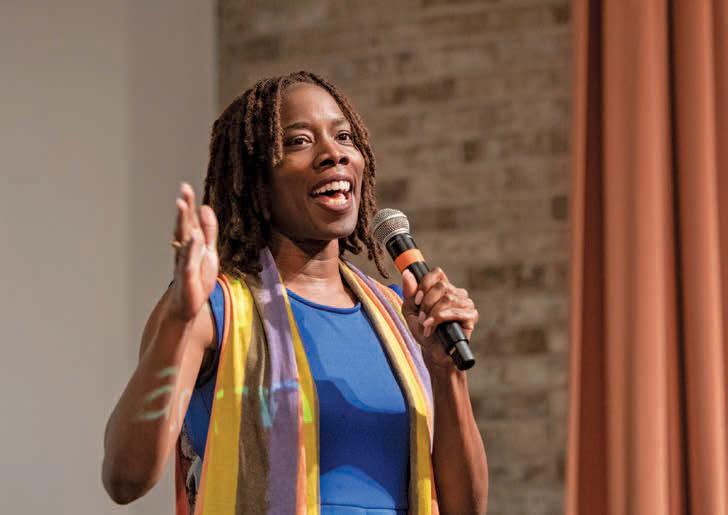
2 minute read
Raising her Voice in Song
Raising her Voice in Song

Thema Bryant-Davis, Ph.D., opened her keynote presentation, Thriving in the Wake of Trauma: Cultural Considerations.
Shana Sureck
Professional Ed conference focused on healing and resilience
It’s not often that a social work keynote begins and ends with full-throated singing. Perhaps that should change. To the surprise and delight of attendees, before speaking a word, Thema Bryant-Davis opened her talk at the Deepening Clinical Practice Conference by belting out “Woke up this Morning (with My Mind Stayed on Freedom.)”
Bryant-Davis, professor of psychology at Pepperdine University, licensed clinical psychologist, ordained minister, playwright and dancer, is an expert in the field of trauma and healing. She also holds her own as a gospel singer, using song to illustrate a key point: There can and should be joy in therapy.
“When people come into the room with their trauma, with their violations, they are wondering, ‘Can it get any better than this?’” she said.
The answer should always be yes. “The miraculous can happen,” she said. Bryant-Davis’ talk touched on themes of clinician self-care, using cultural traditions in healing and strengths-based therapy. The goal of therapy should never settle for cessation of symptoms.
—THEMA BRYANT-DAVIS
“I am on the planet for so much more than healing from whatever my perpetrator did to me,” said Bryant-Davis, to murmurs from the hall.
The conference drew 170 people to the campus June 28 and offered 15 breakout sessions on a range of topics, including cultural humility, spirituality and anti-oppressive approaches in therapy.
Mary Curtin, M.S.W. ’00, manager of professional education at SSW, said in planning the first confer- ence offered jointly by the School’s professional edu- cation and field departments, trauma and resilience rose to the top as the theme.
“We’re seeing rising rates of trauma, suicide, anxi- ety and depression,” she said. “We wanted to change the conversation around fixing a problem to building up strengths and skills.”
Keshia Williams, LCSW, faculty field advisor from California, said she was deeply moved by the keynote.
“The importance of opening with song and the use of her voice in a different way felt really important and really disruptive to the academic way we are all socialized to use our voices,” said Williams. “It opened up possibilities for me about the multitude of ways we can use our voice in academic spaces.”
Noelle Dimitri, LICSW, CCTSW, also faculty field advisor, said it helped her think more deeply as a white person about “how to be an ally and an advo- cate for different populations: There isn’t just one method that fits all groups.”
A doctoral student and social worker at Beth Israel Deaconess Medical Center, she intends to think more deeply about that. “So often we try to fit clients into treatment models that can be outdated and not culturally relevant,” she said.
On that topic, Bryant-Davis urged clinicians to embrace culture in the therapy room. “We have to create space for the beauty, the laughter, the strength and the rich heritage people walk in with,” she said. “Who said healing can only happen in 50-minute increments?”
She urged therapists to ask clients about experi- ences of oppression. “To own that there is an impact of oppression is to re-center our humanity,” she said. “It’s not either-or. Are we victims, or are we strong? They co-exist, our strengths and our vulnerabilities.” She ended as she began, in song, the room full of clinicians, joining in.
—Laurie Loisel








